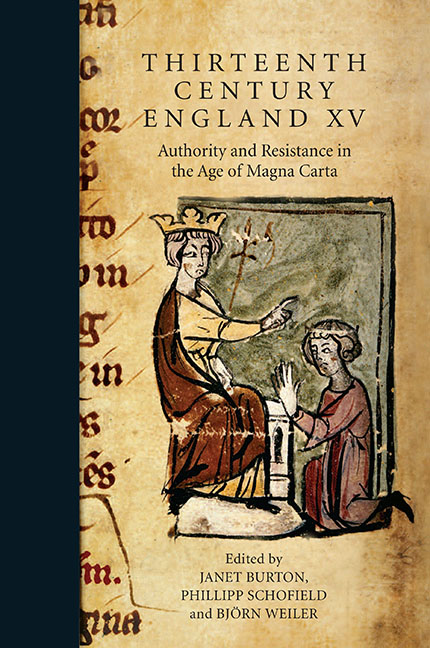 Thirteenth Century England XV
Thirteenth Century England XV Verse Diplomacy and the English Interdict
Published online by Cambridge University Press: 11 June 2021
Summary
Among the many model verses collected in Geoffrey of Vinsauf's popular compositional treatise the Poetria Nova (c. 1210), the longest addresses an unnamed pope, papa potens, on the subject of human disobedience. A rhetorical tour de force, the poem also presents a miniature lesson in governance. Geoffrey begins:
Est papae leges sacras dictare, minorum Praescriptam juris formam servare. Sed errant Quamplures, quorum te, papa, redarguit error. Parcis, non punis, enormia lucra sequentes; Illicitum vedunt et emunt, sine vindice culpae. Papa potens, cujus non est breve posse, memento Vindictae. Mansuete pater, quandoque mucrones Exime. Si dormit vindicta, vagabitur errans, Ut lupus insultans aut ut vulpecula dammae Insidians. (lines 1280–1289)
(To proclaim sacred laws is the pope's prerogative; to observe the form of law prescribed is the part of lesser men. But very many go astray, and that straying judges you, holy Father. You spare, and do not punish, those who seek shameful gain. They buy and sell what is illicit, with no one to avenge their guilt. Powerful Father, you whose power is by no means brief, be mindful of vengeance. Gentle Father, unsheathe at some time the sword's point. If vengeance sleeps, the guilty will range like a wolf crouched to spring, or a fox lurking in wait for the doe.)
Geoffrey crafts these lines to showcase the rhetorical figures of distributio, licentia, diminutio and descriptio. In their concern with papal responsibility and judgement, however, they also echo the contentious arguments that divided the English Crown and papacy in the early decades of the thirteenth century, when Innocent III famously unsheathed the ‘sword's point’ of vengeance against King John in the form of interdict and excommunication. Geoffrey's treatise stages a delicate attempt at healing this rift: the book opens with a lavish dedication to Innocent and closes with an entreaty to this same pope to look forgivingly upon King John, who has recently become ‘the soldier of the cross and of Christ, and sword of the entire church’ (Et Crucis est factus et Christi miles et ensis / Totius Ecclesiae) (lines 2090–1). In proffering his ‘little book’ (libelli), Geoffrey hopes Innocent may also prove ‘receptive’ to John and ‘let him fare better in his role of suppliant’ (attamen esto / Flexilis, et sit ei melius ratione petentis) (lines 2098–9).
- Type
- Chapter
- Information
- Thirteenth Century England XVAuthority and Resistance in the Age of Magna Carta. Proceedings of the Aberystwyth and Lampeter Conference, 2013, pp. 99 - 114Publisher: Boydell & BrewerPrint publication year: 2015
